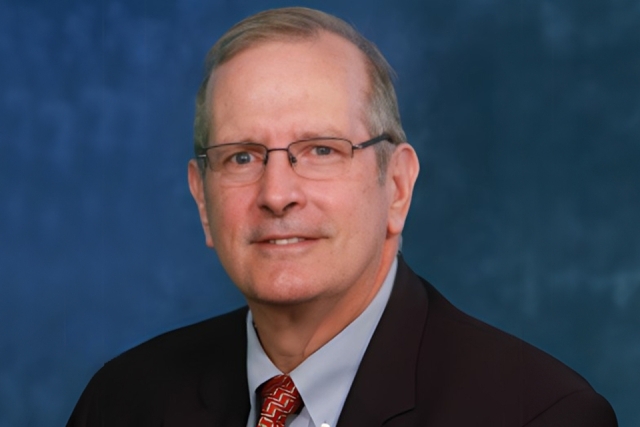
In today’s highly polarized climate, when we welcome a stranger—as St. Vincent de Paul did— or shelter our undocumented immigrants, are we running afoul of state and local governments?
That was the primary question raised by Rev. Craig B. Mousin, M.Div., during St. John’s University’s annual Vincentian Heritage Lecture.
The lecture, part of St. John’s University’s annual Founder’s Week celebration, was held September 23 in the Belson Moot Courtroom housed in the School of Law. Rev. Mousin is an Adjunct Professor of Law and Ombudsperson at DePaul University in Chicago, IL. In 1984, he founded and directed the Midwest Immigrant Rights Center, a provider of legal assistance to refugees, that is now known as the National Immigrant Justice Center.
Rev. Mousin reflected on what a Vincentian response to this climate should look like within the scope of the law, adding that there is a need to adapt the tools Vincent and St. Louise de Marillac used for this time in history.
Pointing to recent events, Rev. Mousin noted recently Texas Attorney General Ken Paxton sued Annunciation House, a volunteer organization based in El Paso, TX, that offers hospitality to migrants, immigrants, and refugees, accusing it of being involved in human smuggling and trafficking.
“Part of this is political, as well as legal,” Rev. Mousin stressed. “Calling them illegal aliens, and saying that they’re part of the border invasion.” He related that Texas sent newly arrived immigrants to Chicago and New York, as well as other cities, with little to no warning. “We’ve really had to do a lot of Vincentian collaboration, trying to find people qualifying housing and shelters.”
He added that Texas is also trying to use state law to subvert federal law in deciding their own immigration policy. “[Texas] is saying if you offer charity to those in need and offer homeless people shelter, you’re going to violate the law.”
Rev. Mousin noted that Texas has targeted ministries of the Diocese of Brownsville, TX. “For example, the state wants to shut down humanitarian rescue centers that serve more than 1,000 migrants a day. The diocese argues their work of charity flows directly from the Gospel-inspired mission to restore human dignity. So, we are in the midst of a, big, big fight.”
Rev. Mousin related that the League of United Latin American Citizens reported that between 2020 and 2024 it tracked more than 561 anti-immigrant proposals across 45 states—a 350 percent increase since 2020.
“It’s not just the border states that are anti-immigrant at this point,” he stressed. “We also know the statistics that reveal border crossings in Arizona or Texas are among the most dangerous places due to the desert and heat. The International Organization for Migration has called the US–Mexico border the deadliest land crossing in the world. Nevertheless, Arizona prosecuted volunteers who left water in the desert for the people who were dying from thirst. One was actually convicted.”
The proposed Protecting Federal Funds from Human Trafficking and Smuggling Act would defund any US nonprofit organization found complicit in human smuggling or exacerbating the crisis at the southern border, he explained.
“What’s the heart of the problem?” Rev. Mousin asked. “Vincent, Louise, and St. Elizabeth Ann Seton said, ‘I’m going to offer you a shelter if you need it.’ Today, they would be accused of illegal smuggling and harboring. That’s the world we’re in right now.”
Rev. Mousin said this attitude has led to threats against Catholic Charities nationwide, and immigration has become one of the nation’s most polarizing issues.
Rev. Mousin pointed to Blessed Frédéric Ozanam, who lived in polarizing times as well. “He invited his colleagues to step into the divide that separates us. We have an obligation to be the ones. We can have strong feelings, yet somehow we have to make this divide not break us apart.”
He encouraged students to immerse themselves in the life of Ozanam to find inspiration. “He didn’t wait. He started the Society of St. Vincent de Paul. It is so exciting to me what you can accomplish when you have a few friends and help each other. He encouraged us to get involved.”
Another lesson from Vincent, Rev. Mousin stressed, is the creation of institutions. “They couldn’t do it by themselves. We need this community battle for the sake of the mission.” He added, “Vincent was so skilled at building community. He was insightful about the law. He understood legal structures and relationships.”
In the final analysis, Rev. Mousin explained, Vincent employed God’s justice and charity in all his dealings. “Seek first the kingdom of God and God’s justice. Why am I doing that? Consider first all the glory of God and seek God’s justice. Justice presupposes love. For one needs to love a person a great deal in order to respect their rights.”
Related News
Q&A with School of Education Alumna Linda I. Rosa-Lugo, Ed.D. ’77ED, ’79M.S.Ed.
Linda I. Rosa-Lugo, Ed.D. ’77ED, ’79M.S.Ed., recently accepted a new role as President of the American Speech-Language-Hearing Association (ASHA). Prior to this, Dr. Rosa-Lugo has been an active...
Insurance Leader of the Year Dinner Raises $3.6M for GSRM Students
A global gathering of aspiring students, insurance industry executives, and other supporters of the Greenberg School of Risk Management, Insurance and Actuarial Science (GSRM)—part of The Peter J...
TSOE Alumna Appointed Director of Curriculum in Amityville
Jessica Kemler ’99ED,’22Ed.D.—a double alumna of The School of Education at St. John’s University—began the new year as the new Director of Curriculum in the Amityville, NY, School District. “We are...
